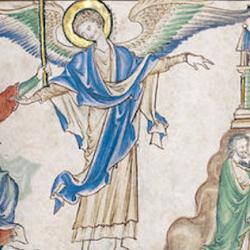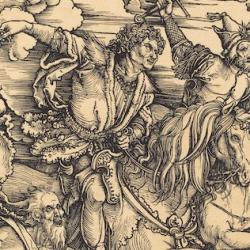After the Lamb ascends to heaven, the living creatures and elders suddenly have bowls (phiale) of incense (Revelation 5:8). The incense is identified with the “prayers of the saints.” They are like the leaders of the tribes in Numbers 7, each of whom brings, among other things, “one gold pan of ten shekels, full of incense” (Numbers 7:14, 209, 26, etc.).
The prayers don’t seem to have any effect at this point, but at least they have gotten into heaven, where the Lamb and the Father can hear. The incense is available, but it’s not being used yet. It’s being stockpiled for later.
When the Lamb opens the fifth seal, we hear the prayers of those saints, beneath the altar, crying out for God to vindicate their blood (6:9-11). They are told to wait. Their prayers still don’t have any effect. Now we have prayers, and we know there’s incense in heaven to accompany them. But they haven’t yet been combined into a combustible compound.
But then the last of the martyrs are marked out (7:1-8), and the multitude of old martyrs are elevated to the throne. At that point, incense and prayer are combined. “Another angel” stands at the altar – the same altar, presumably, at whose base the martyrs have been – and he has a golden censer (libanotos) and “much incense” (8:3). When He gives the incense to the prayers, it creates smoke, which arises and provokes a response. The angel himself fills the censer with coals from the altar, and throws them to earth, creating thunder, noises, lightning, and an earthquake – the shaking of the earth that we see unfolded in the trumpet section of Revelation.
Ultimately, that smoke will produce more smoke – the smoke from fire that burns those who worship the beast (Revelation 14:11), the smoke of the burning harlot city, Babylon (18:9, 18; 19:3). The prayers of the saints create an image of Yahweh’s smoky glory, and from within that cloud, the God who is a consuming fire acts to judge and save.










